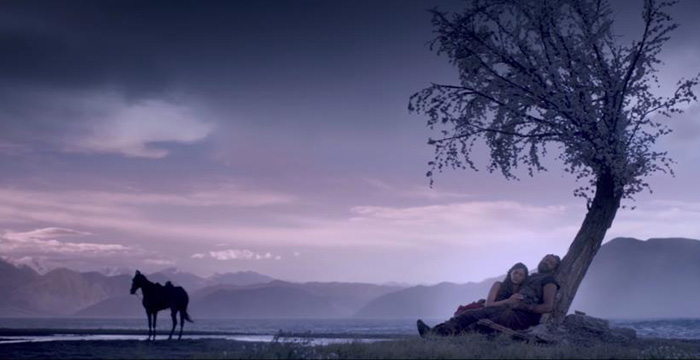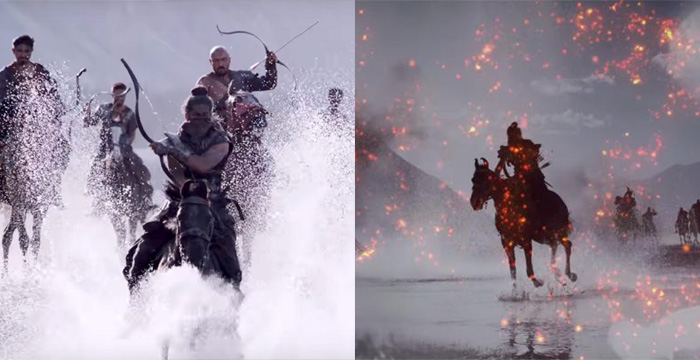Two parallel stories, one melancholic and the other casually brave; the former manages to create an impact but the later lacks the passion for love. An extreme effort to convey love as the driving force to face all odds in a musically equipped poetic narrative way of storytelling, Rakeysh Omprakash Mehra’s Mirzya is visually stunning.
With landscapes like vast deserts, snow clad regions, mountainous terrain, transparent waters and royal raj mahals shot high and low, enriching music with deep thought provoking lyrics coupled with folklore dances, the film seems to be a comprehensive love story which unfortunately is not that appealing at its basic roots.
Two childhood friends made for each other, Munish played by Harshvardhan Kapoor and Suchitra played by Saiyami Kher unknowingly get their souls entangled with the immature strings of friendship. A dreadful incident separates the duo but fate brings them back years later. As they cross each other’s path, their shoes have changed, as Saiyami is now a Princess who is supposedly going to get married to Prince Karan (Anuj Choudhry) while Harshvardhan now Adil serves as a honest stable boy.

These souls destined for each other fall in love again as they relive their memories of their childhood. Meanwhile, Zeenat (Anjali Patil), who is the daughter of an ironsmith (Om Puri) who provides shelter to Adil all these years, develops a soft corner for him. So there is a tiny love triangle but it is short lived.
Till now it follows the usual tale of a princess and pauper but the parallel story brings in the dramatic experience. The first lifetime of the lovers is set in an unspecified period where Mirza (Harshvardhan Kapoor) comes streaming on horseback armed with bows and arrows. Saiyami Kher poses as a beauty to be rescued by her horse prince from the clutches of armed men. However, the reason behind the violence and battle in the past is not completely clear.
The film keeps dangling between this era and the present story quite often but the connection in these two stories does not seem to create a startling effect. The story of that era is dramatised with slow moves and expressions explaining the scenario while the present lacks both. Gulzar’s attempt to build a connection between both the stories is seen at different occasions as things untold in one are told in the other.

Music takes the lead. Mirzya can be termed as a musical drama because the lyrics, the tempo of the dance performance along with the background score sets the mood and tells most of the story. (In few sequences when the actors are expressionless, the lyrics convey the emotions behind the particular act.) With names like Gulzar, Shankar-Ehsaan-Loy and Daler Mehndi working on the film, there are 15 tracks in the album including six short songs on the character of Mirzya.
The snow clad terrain, widespread desert, fireballs, arrows, armed forces racing with rage and horses galloping in the waters seamlessly blend with the actual setting of the film. The terror and rage of that era is well enhanced with the visual effects of fireballs, set extensions, matte paintings and background creation. The CGI lioness seen in the two sequences blends well with the film as the presence of darkness in those shots helps to create an engaging effect. Prana Studios has produced the visual effects for the film and has lived to its stature of delivering quality work.
Mirzya is music to the ears and beauty to the eye with the splendid cinematography done by Pawel Dyllus. However, the tale based on the tragic romances of Punjab ‘Mirza Sahiban’ lacks the passion for love and the engaging factor that keeps you totally engrossed in the love story of the two souls.
